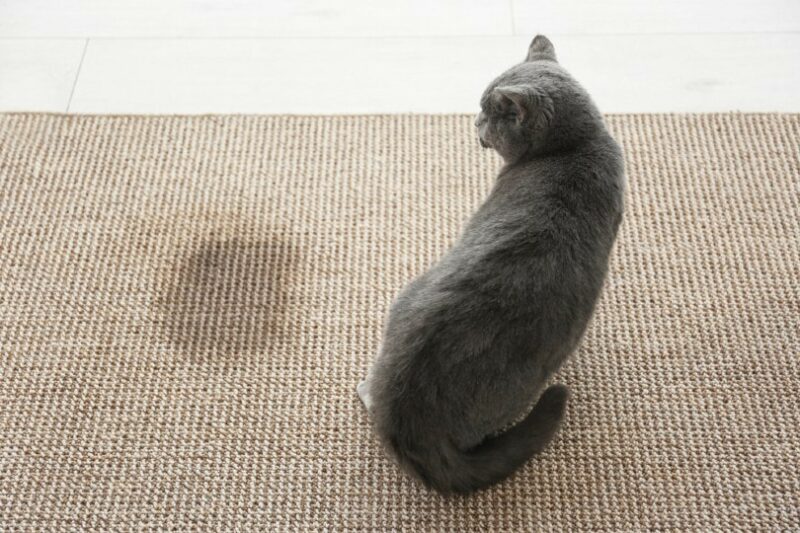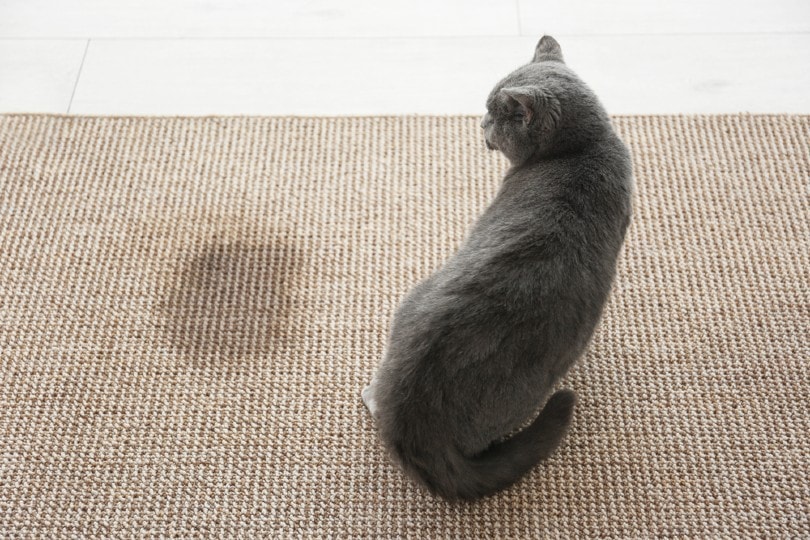
Whatever the reason, if you are regularly dealing with cat urine-stained clothing or bedding, you’re obviously in the market for laundry detergent that can deal with this kind of odor. But where to start?
We look at what the best cat urine laundry detergent or pre-treatments are that can handle this kind of stubborn stain and smelly odor. We hope that our reviews will help you find the best laundry product to deal with your particular situation.
A Quick Comparison of Our Favorites of 2024
| Image | Product | Details | ||
|---|---|---|---|---|
| Best Overall |

|
Nature’s Miracle Laundry Boost |
|
CHECK PRICE |
| Best Value |
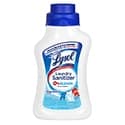
|
Lysol Laundry Sanitizer Additive |
|
CHECK PRICE |
| Premium Choice |

|
Skout’s Honor: Pro Laundry Booster |
|
CHECK PRICE |
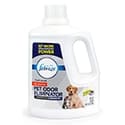
|
Febreze Laundry Pet Odor Eliminator |
|
CHECK PRICE | |
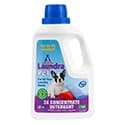
|
LaundraPet Laundry Detergent |
|
CHECK PRICE |
The 10 Best Laundry Detergents for Cat Urine
1. Nature’s Miracle Laundry Boost – Best Overall
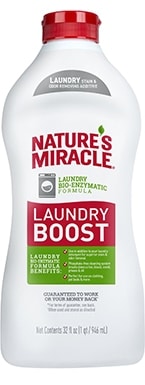
| Size: | 32 oz |
| Liquid or Powder: | Liquid |
| Detergent or Additive: | Additive |
| Scented: | Yes |
The best laundry additive for cat urine is Nature’s Miracle Laundry Boost. This isn’t actually a detergent, but it can be used as a pretreatment and an addition to your usual laundry detergent. Nature’s Miracle was made specifically to deal with stains and odors caused by pets, including blood, vomit, and cat urine. It’s phosphate-free but still works to get rid of old stains and odors. It is safe to use in your laundry (although, always read and follow the directions first).
The main disadvantages are that not everyone will find that the urine smell will disappear (at least not right away), and the company recently redesigned the bottle, which seems to be more difficult to use.
- Can be used as a pretreatment and with regular detergent
- Designed to handle cat urine, as well as blood, vomit, feces, etc.
- Trusted company for 35 years
- Phosphate-free but will still clean stubborn stains and odors
- Not every cat owner will be satisfied with the results
- Redesigned bottle difficult to use
2. Lysol Laundry Sanitizer Additive – Best Value
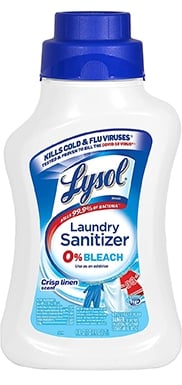
| Size: | 41 oz |
| Liquid or Powder: | Liquid |
| Detergent or Additive: | Additive |
| Scented: | No |
The best laundry booster for the money is Lysol Laundry Sanitizer Additive. This is not a cat urine laundry detergent, but it is designed to be added to the laundry with your regular detergent or can be used on its own to remove stains and odors (and bacteria). It can kill 99.9% of all kinds of bacteria, including pathogenic and odor-causing bacteria. It doesn’t contain bleach or phosphates and can work on cat urine.
On the downside, while it doesn’t affect everyone, some people seem to come down with some form of rash or hives when coming into contact with fabric that has been washed with this product. You might want to avoid this product if you have sensitive skin.
- Good price
- Can be added to your regular detergent
- Kills 99.9% of bacteria
- Doesn’t contain bleach or phosphates
- Some people might develop hives or rash
3. Skout’s Honor: Professional Strength Laundry Booster – Premium Choice
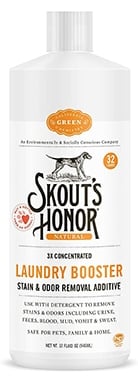
| Size: | 32 oz |
| Liquid or Powder: | Liquid |
| Detergent or Additive: | Additive |
| Scented: | Yes |
Our pick for premium choice for the best cat urine remover is Skout’s Honor Professional Strength Laundry Booster. This is an additive rather than actual laundry detergent, but when used with your detergent, it will remove cat urine stains and odors. It is biodegradable and environmentally friendly because it doesn’t contain any harsh chemicals. Skout’s Honor is designed to remove tough odors and stains such as vomit and blood (in addition to the urine), and it offers a 100% satisfaction guarantee for a full refund. In addition to all this, it also provides a day’s worth of food for a needy animal for every bottle sold.
However, it is expensive, and it might not necessarily work on all odors. You should do a small spot-check before use, as discoloration might occur.
- Additive that eliminates cat urine stains and odors
- No harsh chemicals and is biodegradable
- Removes tough stains and odors (urine, vomit, blood, etc.)
- 100% satisfaction guarantee for a full refund
- With every bottle sold, the company donates a day’s worth of food to a needy animal
- Expensive
- Might not always remove the odor
- Discoloration might occur
4. Febreze Laundry Pet Odor Eliminator
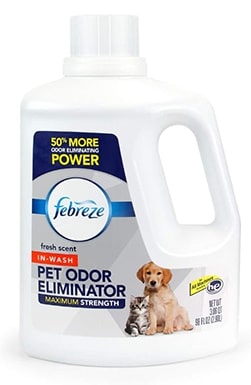
| Size: | 98 oz |
| Liquid or Powder: | Liquid |
| Detergent or Additive: | Additive |
| Scented: | Yes |
Febreze’s Laundry Pet Odor Eliminator is an additive that you use along with your laundry detergent. It is designed to eliminate odors instead of just covering them and is specifically meant for pet odors. It can be used to pretreat before washing and is safe to use with all detergents, fabric softeners, and bleaches. It can also be used in HE washing machines.
Unfortunately, it is a little expensive, and it might not be as effective on older stains that have had time to set in.
- Eliminates pet odors instead of just masking them
- Can be used to pretreat before washing
- Can be used in HE washing machines
- Safe to use with all bleaches, fabric softeners, and detergents
- Expensive
- Not as effective on older stains
5. LaundraPet Premium Laundry Detergent
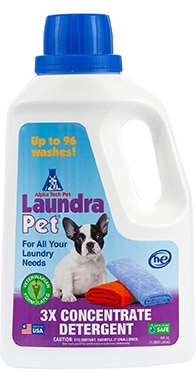
| Size: | 64 oz |
| Liquid or Powder: | Liquid |
| Detergent or Additive: | Detergent |
| Scented: | Yes |
LaundraPet Premium Laundry Detergent is suitable for pet stains and odors and can clean up to 96 loads of laundry. It is made with non-soap ingredients that provide three times the cleaning power of other detergents and is also low suds and non-toxic.
The disadvantages are that it is on the pricey side, and it won’t always be able to remove the cat urine odor.
- Detergent for pet stains and odors
- Washes up to 96 loads
- Made without soap and is low suds and non-toxic
- Cleans 3x better than other detergents
- Expensive
- Might not be able to remove odors
6. Persil ProClean Power-Liquid Laundry Detergent
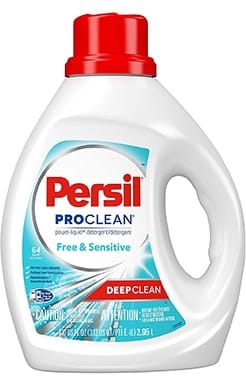
| Size: | 100 oz |
| Liquid or Powder: | Liquid |
| Detergent or Additive: | Detergent |
| Scented: | No |
Persil’s ProClean Power-Liquid Laundry Detergent is great for people with sensitive skin and does not contain any perfumes or dyes. It can wash up to 64 loads and is designed to be gentle on skin and fabric but provides strong cleaning power. It is phosphate-free and hypoallergenic.
The biggest problem with this detergent is the packaging. Many containers arrive leaking, so you might want to consider buying this one in a store rather than through delivery.
- Good for sensitive skin
- Does not contain perfumes or dyes
- Gentle on fabric and skin but strong cleaning power
- Hypoallergenic and phosphate-free
- Containers tend to leak during delivery
7. Zero Odor Laundry Odor Eliminator
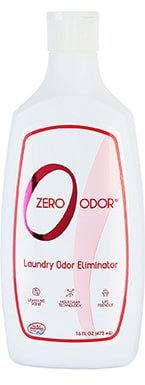
| Size: | 16 oz |
| Liquid or Powder: | Liquid |
| Detergent or Additive: | Additive |
| Scented: | Yes |
Zero Odor Laundry Odor Eliminator works as an additive to your cat urine laundry detergent or regular detergent to eliminate smelly odors from sweat, smoke, and pets. It is also designed to clean your washing machine at the same time. It is biodegradable and non-toxic and doesn’t cover up odors with perfume.
On the downside, while the label states that it doesn’t use perfumes to mask odors, this product has an unmistakable scent, so it’s not hypoallergenic. It is also somewhat expensive.
- Additive good for sweat, smoke, and pets
- Deodorizes the washing machine at the same time
- Doesn’t mask odors with perfume
- Non-toxic and biodegradable
- Scented, so not hypoallergenic
- Expensive
8. All Liquid Laundry Detergent
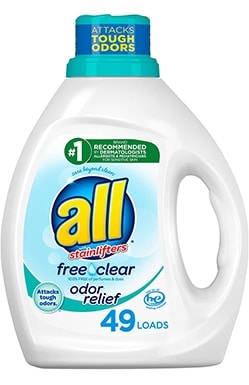
| Size: | 88 oz |
| Liquid or Powder: | Liquid |
| Detergent or Additive: | Detergent |
| Scented: | No |
All’s Liquid Laundry Detergent is a great laundry detergent if you have sensitive skin. It contains no dyes or perfumes, and it has enough for about 49 loads. This detergent is advertised as the number-one brand recommended by dermatologists, pediatricians, and allergists, and it is effective against cat urine.
The issues with this detergent are that it isn’t always effective against odors, and it tends to arrive leaking during delivery.
- Good for sensitive skin
- Doesn’t contain dyes or perfumes
- Enough for 49 loads
- Chosen as the best detergent by dermatologists, pediatricians, and allergists
- Isn’t always effective against odors
- Might arrive leaking during delivery
9. Dead Down Wind Laundry Detergent
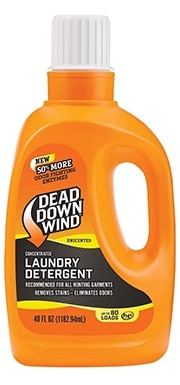
| Size: | 40 oz. |
| Liquid or Powder: | Liquid |
| Detergent or Additive: | Detergent |
| Scented: | No |
Dead Down Wind Laundry Detergent is made for hunters as a way to keep odors down so they can’t be scented while outdoors. It can work just as well for cat owners looking to eliminate that urine smell. It works for sensitive skin, is unscented, and contains enzymes to help break down stains and odors. This cat urine laundry detergent cleans clothes, removes odors, and protects your fabrics, which enables them to last longer.
The primary disadvantage is that during delivery, some of the bottles are prone to leaking.
- Good for sensitive skin
- Unscented and contains enzymes for stains and odors
- Cleans clothes and eliminates odors and fabric lasts longer
- Might leak during delivery
10. Biz Laundry Detergent Powder Booster

| Size: | 50 oz |
| Liquid or Powder: | Powder |
| Detergent or Additive: | Additive |
| Scented: | Yes |
Biz Laundry Detergent Powder Booster is an additive for your laundry detergent, and it contains enzymes that are effective against cat urine. It also includes whitening and peroxide agents to help whiten your wash and add extra power against stubborn stains and odors. You can pre-treat or pre-soak the fabrics before washing and add it to the washing machine for additional effectiveness.
However, you might find it to be a little on the expensive side (at least compared to some others), and some users might not find it effective enough against odors.
- Contains enzymes that work well against cat urine
- Includes peroxide and whitening agents
- Pre-treat, pre-soak, and use in every wash
- A little expensive
- Might not be as effective against odors
Buyer’s Guide: Selecting the Best Laundry Detergents for Cat Urine
Before you decide on a new detergent or additive, you might want to check out our buyer’s guide. We go over a few things that you’ll want to think about before paying for a product.
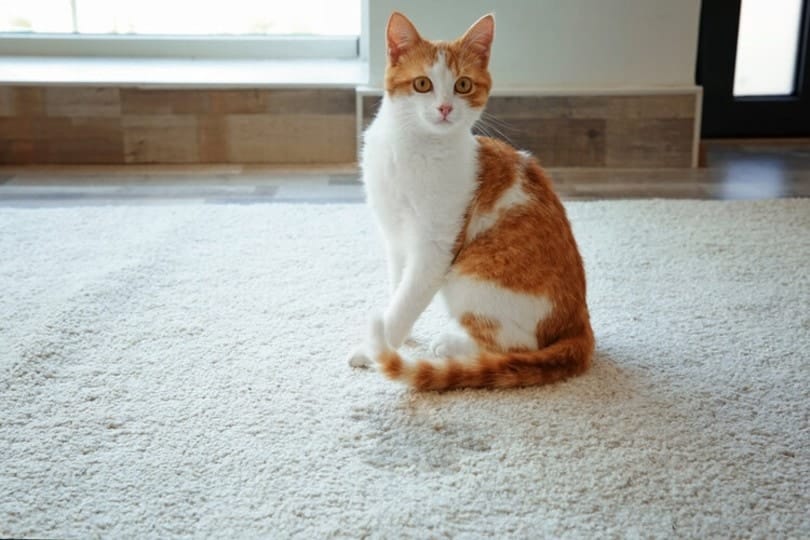
Scented or Unscented
Most additives and detergents will be scented. If you don’t mind a strong, perfumey scent, this is nothing to worry about. But if you have allergies or sensitive skin, you’ll want to check the ingredients before purchasing. It’s important to note that a strong fragrance won’t remove the scent of cat urine from your clothing. You want to aim for something that eliminates the odor and not just covers it up.
Enzymes
The use of enzymes is the most effective way to remove cat urine odors from anything. They work to break down the urine’s pH to remove odors and stains. This will also help prevent your cat from urinating in the same spot repeatedly because that scent will disappear and won’t keep drawing your cat.
Testing
When you’re trying to eliminate tough scents and stains, the additive and detergent tend to be stronger. It’s important that you test a spot (particularly on a more delicate fabric) in a more hidden area before throwing it into the wash entirely. This way, you won’t accidentally ruin your favorite shirt or blanket.
Delivery
Many negatives of these products tend to be about leaking during delivery. This isn’t a common occurrence but it’s always a possibility. We don’t know for certain if it’s due to the design of the containers or the delivery service itself, but it’s good to be aware that this could happen, and you might want to consider shopping for the product in person.
Time
The older the stain, the longer you will want to pre-soak it before actually washing it. Double-check the product before purchasing and read the instructions carefully. Not every detergent or additive will work on old stains.
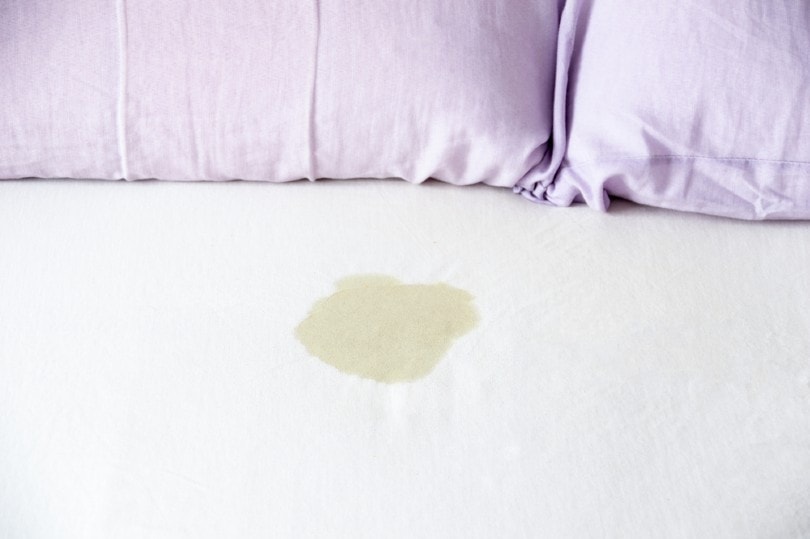
Summary
We hope that these reviews will help you find the right detergent (or additive) that works best for you. Our pick for the best overall additive product is Nature’s Miracle Laundry Boost because of its use of enzymes for breaking down those odors. We picked the Lysol Laundry Sanitizer Additive as the best value product for killing off harmful bacteria at a great price.
Finally, our choice for a premium additive is Skout’s Honor Professional Strength Laundry Booster because it’s an environmentally conscious product, and the company clearly cares about pets!
Featured Image Credit: New Africa, Shutterstock
Contents
- A Quick Comparison of Our Favorites of 2024
- The 10 Best Laundry Detergents for Cat Urine
- 1. Nature’s Miracle Laundry Boost – Best Overall
- 2. Lysol Laundry Sanitizer Additive – Best Value
- 3. Skout’s Honor: Professional Strength Laundry Booster – Premium Choice
- 4. Febreze Laundry Pet Odor Eliminator
- 5. LaundraPet Premium Laundry Detergent
- 6. Persil ProClean Power-Liquid Laundry Detergent
- 7. Zero Odor Laundry Odor Eliminator
- 8. All Liquid Laundry Detergent
- 9. Dead Down Wind Laundry Detergent
- 10. Biz Laundry Detergent Powder Booster
- Buyer’s Guide: Selecting the Best Laundry Detergents for Cat Urine
- Summary


